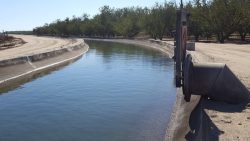
U.S. Rep. Jeff Denham (R-CA) now has the support of another federal agency in his ongoing fight against home-state bureaucrats that the congressman says are attacking his Central Valley residents via a controversial water proposal.
U.S. Environmental Protection Agency (EPA) Acting Administrator Andrew Wheeler, who visited the Central Valley on Oct. 11 at the request of Rep. Denham, now has directly contacted the California State Water Resources Control Board expressing concerns about its proposed amendments to the Water Quality Control Plan for the San Francisco Bay/Sacramento-San Joaquin Delta Estuary.
“I’m pulling every available resource to stop the state’s dangerous water grab,” said Rep. Denham on Nov. 2. “Both the Department of the Interior and EPA have now directly weighed in against Sacramento’s plan to steal our water.”
U.S. Department of the Interior (DOI) Secretary Ryan Zinke in July visited California reservoirs at the request of Rep. Denham and subsequently sent an internal memo on Aug. 17 to DOI agencies requesting all Central Valley project authorities be provided to him to combat the state’s plan, according to a statement released by Denham’s office.
Rep. Denham told The Ripon Advance this summer that without federal-level changes to water policy, not only would California be left unprepared for the next drought with insufficient water storage and infrastructure, “but the state’s dangerous water grab will be allowed to continue, sending more of our supply into the ocean, crippling our Central Valley economy, farms and communities.”
The congressman said the state’s plan would siphon off at least 40 percent of California’s rivers, basically flushing significant amounts of usable water into the ocean.
In his Oct. 31 letter to Felicia Marcus, chair of the State Water Resources Control Board, the EPA’s Wheeler voiced some of the same concerns and questioned the effectiveness of increasing flows to improve native fish species when previous studies have shown other factors contribute to the declining fish populations, such as predation from non-native species. He noted that the Bay-Delta plan doesn’t address such topics.
“The EPA supports the appropriate exercise of state discretion in matters relating to the protection of state water resources,” Wheeler wrote. “However, the breadth and complexity of the Bay-Delta Plan and the potential of the plan to conflict with federal law calls for a careful federal review of any Bay-Delta Plan that California finalizes.”
Wheeler concluded that while the public comment period for the proposed Bay-Delta Plan has closed, “given the significant federal interests that are potentially affected by this proposal, we request the State Water Resources Control Board consider these comments and those submitted by the DOI prior to taking final action on the Bay-Delta Plan.”
Oakdale Irrigation District General Manager Steve Knell said Wheeler’s letter brings common sense to addressing the state’s water plan.
“Thank you Congressman Denham for your efforts in bringing Mr. Wheeler to our area to hear our concerns,” Knell added. “This state water plan will devastate water storage in our dams, drive river temperatures to lethal levels and destroy the very fish species we at the local level are trying to protect. Our rivers deserve better.”
Peter Rietkerk, general manager of the South San Joaquin Irrigation District, also thanked the lawmaker “for bringing Acting EPA Administrator Andrew Wheeler to our region.”
“We’ve continued to lament the devastating impacts of the state’s plan to local drinking and irrigation water supplies, and to protected fish species within our rivers, and it is great to know that the EPA has listened and will be looking for balance and accountability from the State Water Board if they choose to approve this outrageous plan,” said Rietkerk.
Chief among others at the federal level who support Rep. Denham’s request to end the state’s water plan are President Donald Trump, who received a Sept. 28 letter from the congressman requesting executive action. Trump consequently signed a memorandum to bring more storage to the Central Valley and to address hydroelectric relicensing at Don Pedro.
As a follow-up to the presidential memorandum, Rep. Denham hosted a call with senior administration officials from the Bureau of Reclamation to discuss the memo’s details, what future steps should be taken, and to take questions from irrigation districts and farm bureaus, according to his statement.



